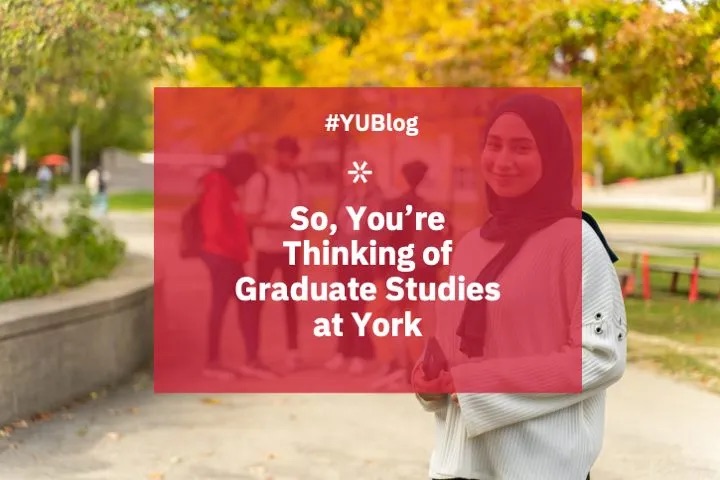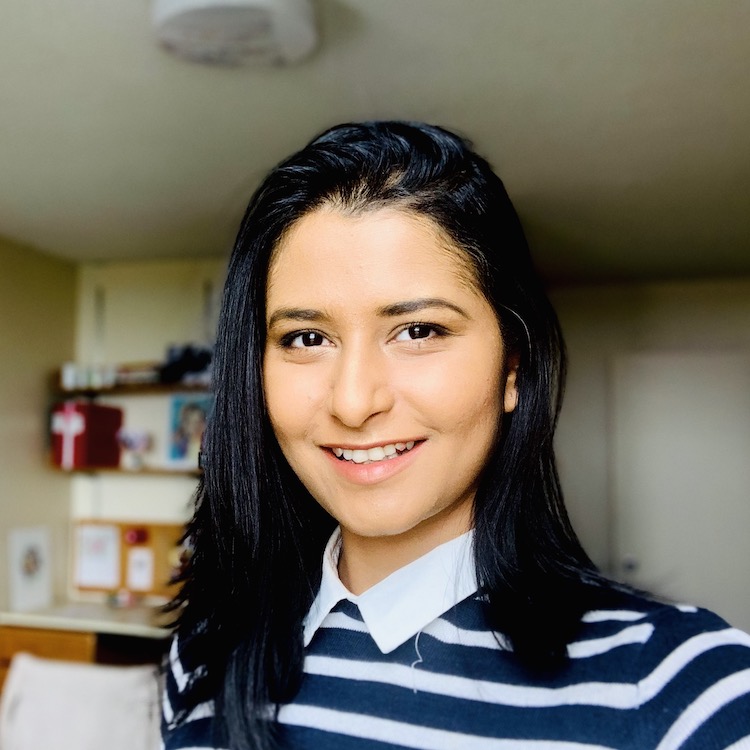
If you want to pursue graduate studies, it’s time to start planning and getting all your ducks in a row! Yes, some of you may still have years until you graduate, but it is always better to start exploring your options and making connections that will be helpful when you begin your application process. This #YUBlog is here with some ideas on where to begin your planning and how to go about it!
You may already know what you want to do after your undergraduate degree, but if you don’t that’s okay! You never know when something or someone will inspire you or open up an opportunity you never considered. To make sure that you are well equipped to plan your graduate studies, Christina Arcena Andaya, a second-year master’s in sociology student at York has some pro tips to share with you.
Andaya thought graduate school was intimidating at first, but she heard great things about the sociology graduate program in York. What inspired her to apply was the Global Labour Research Centre lecture series and one of her undergraduate degree professors.
Pro tip: If you are mulling over graduate studies, it may not be a bad idea to speak to the professors you are comfortable about and ask for advice. Keep tabs on the FGS events calendar to register for those that can give you information!
I asked Andaya what things she considered when choosing her master’s degree program. Here’s what she had to say:
My most significant considerations were the research topic that best suited my academic needs and choosing the right graduate supervisor.
Step 1: Review your eligibility

Remember, if you start to consider graduate studies, admissions calculates your admissions GPA using the last 60 credits on your transcript when you apply.
Be consistent with your grades and make them count! If you’re falling short, contact the Graduate Studies office to understand your options.
To be eligible for a master’s degree, you need to graduate with an Honours undergraduate degree or equivalent (typically a four-year, full-time program) from a recognized post-secondary institution.
To be eligible for a Ph.D., you must graduate with a master’s degree or equivalent from a recognized post-secondary institution.
Make sure to check program-specific eligibility requirements. Explore the Entry Requirements page for more information. You should also check the International Credential Equivalencies if you are an international student.
Step 2: Save important dates
The next step is noting all deadlines. Graduate studies at York consist of three academic terms: fall, winter and summer terms. Deadlines may vary from year to year, so it is a good idea to check the important dates page as you move closer to the application period.
Success tip: Most programs only accept students for the fall. Application due dates vary, so make sure you make note of all deadlines!
Please note: When planning your application, consider mailing and processing times for supporting documentation. The Office of Admissions can take 10 to 15 business days to process documentation during peak time.
Step 3: Research, research, research

When looking for the perfect program, we mostly think of exploring university websites for their programs, instructors, graduate research options and so on. Andaya has a unique tip for you!
Speak to students who are currently in or have been in the programs of your choice. Their insights will be super valuable in understanding the program, instructors, and admission process and getting your doubts cleared!
Some students plan as early as two years before submitting their application. Here’s a quick breakdown of how to approach this process.
Important to note: Admission requirements will differ from program to program. Pay close attention to what your specific program needs from you.
Program-specific notes to consider
Before we get into the nitty-gritty, remember not to think of a master’s degree as a continuation of our undergraduate degree – explore programs that interest you. For example, English majors may want to pursue a master’s in English or in programs like public policy, business, law, and communications to name a few. Don’t forget to shop around for the program you are interested in.
Master’s programs traditionally come in one of the following three formats:
- Coursework only (100% of time spent on courses)
- Major research paper (75% coursework, 25% research)
- Thesis (50% coursework, 50% research)
Some programs offer all three components, while some offer combinations of these options. Make sure to check what is available to you in the programs of your choice and which component or combination suits your academic goals best.
Do you need a graduate supervisor?
The thesis and the major research paper routes require a supervisor. Check with your program of choice to find out whether it automatically assigns supervisors or whether you need to find one ahead of your application.
Your supervisor should share your research interests, and it is important to ensure your chosen program has a person you would like to work with. Read more about graduate supervision.
Step 4: Prepare your application package

Wondering how to go about recommendation letters? Andaya’s got you covered!
Networking with your instructors is an excellent way for them to get to know you and vice versa. They can help you according to how you learn, and you can better understand their expectations. Instructors are more likely to provide a strong reference if they know you. If you share a good rapport with them, you can also approach them to help you with the application process – like looking over your statement of interest, resume, or portfolio.
With all the research you’ve done so far, this step may look easy. But don’t take it lightly. You will be one of thousands of students applying for the same spot. Your statement of interest and letters of recommendation need to stand out. Here are some tips on what makes a good statement of interest and how to get the recommendation letters you want.
Also, check out this list of all the documents you may need to complete your application package.
Success tip: Don’t forget to book an appointment at the Writing Centre to help finalize your statement of interest, portfolio, writing samples and other documents.
In addition, we encourage you to review our Fall 2022 open house playlist – Experience Grad York. Here you will find one hour recordings on graduate admissions, the student experience, Dean Loebel’s session on “how to write a statement of interest,” graduate funding and much more!
Let us know in the comments below what programs you are applying to!
